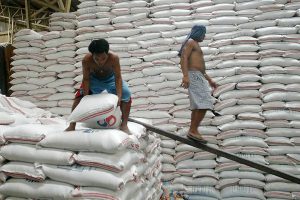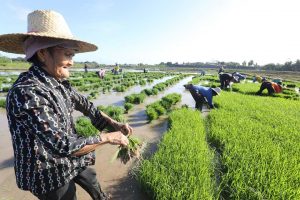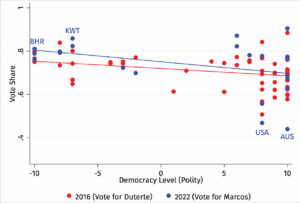RCEF aid called inaccessible as bid to repeal rice law intensifies

THE industry modernization component of the Rice Tariffication Law, which is funded by tariffs on rice imports, has been inefficiently handled, with rice farmers unable to tap the program’s benefits, resulting in rice production remaining stagnant, a peasant organization said.
“The P10 billion (in annual funding) could not compensate for the losses of the rice industry. Not all rice farmers can access the (Rice Competitiveness Enhancement Fund). We have received complaints from farmers that they have not received or accessed RCEF, even though they are registered. In some areas, seed distribution is delayed,” Amihan National Federation of Peasant Women Secretary-General Cathy Estavillo said in an e-mail.
RCEF receives P10 billion from rice import tariffs a year for six years to drive farm mechanization, seed development, propagation and promotion, credit assistance, and extension services.
Ms. Estavillo called for the repeal of the Rice Tariffication Law because the liberalization of rice imports did not lower prices after the National Food Authority (NFA) was stripped of its function as the primary importer of the grain.
“The flood of rice imports as a result of the liberal import (policy) resulted in the drop in the farmgate prices of palay and losses in the first two years of its implementation…rice farmers were pushed deeper into poverty and bankruptcy due to the low prices of palay,” she said.
“It also limited the (ability) of the NFA to (put together a buffer stock); thus, it can no longer regulate the market price through subsidized (rice), which is no longer available in markets. The proponents of the law promised that retail prices of rice would fall to P25 per kilo, but our experience for the first three years of implementation proved otherwise,” she added.
Magsasaka at Siyentipiko para sa Pag-unlad ng Agrikultura Regional Coordinator Rowena A. Buena said that the law “virtually obliterated the rice market and buried rice farmers neck-deep in debt.”
“It basically intensified the food security problem both in the peasant and consumer sector… food security (has) always been problematic in the Philippines. On the production level, with chemical-based agriculture as the dominant production system, farmers are trapped in a cycle of expensive production costs and unpredictable yields,” she said in an e-mail.
“Paired with neoliberal policies such as the (Rice Tariffication Law) that allows the unregulated entry of foreign rice… farmers are once again burdened (by) unfair market prices. If not, farmers are totally removed from the market (losing the) chance to sell their milled rice at a price that would sustain them,” she added.
Ms. Buena said that conventional farmers and agricultural workers were also falling ill due to the continuous usage of glyphosate, a herbicide.
“It tells us that both the current agricultural production system and the neoliberal policies that govern it are not actually built to achieve food security. Ironically, it… serves only the profits of agri-transnational corporations (which) is the very reason we have food insecurity in the first place,” she said.
“Addressing food insecurity and malnutrition will start with shifting from chemical-based agriculture to sustainable organic agriculture that puts emphasis on a diversified and integrated farming system ultimately championing a diversified, accessible, and nutritious diet for the masses,” she added.
“The seeds distributed under RCEF are dependent on massive use of chemical farm inputs which [also] increases the cost of production, instead of promoting local and traditional varieties,” Ms. Estavillo added.
Ms. Estavillo recommended that the government provide a P15,000 production subsidy, build accessible post-harvest facilities, and improve irrigation services. — Luisa Maria Jacinta C. Jocson




